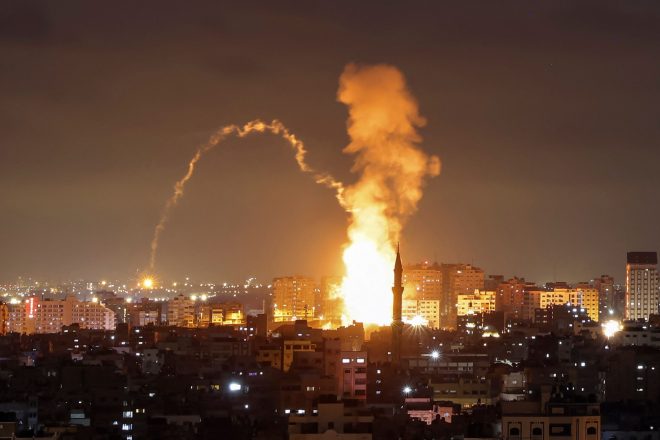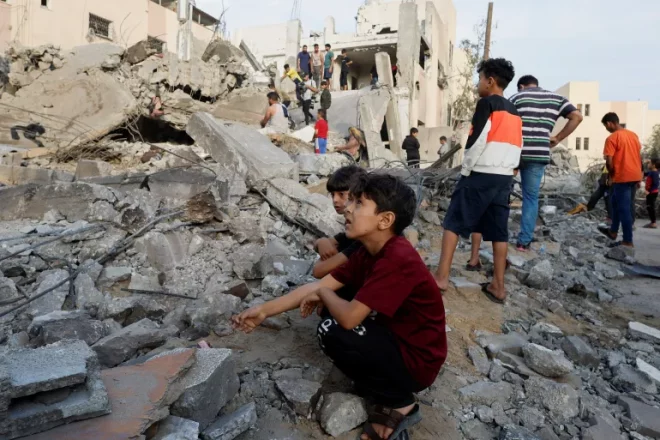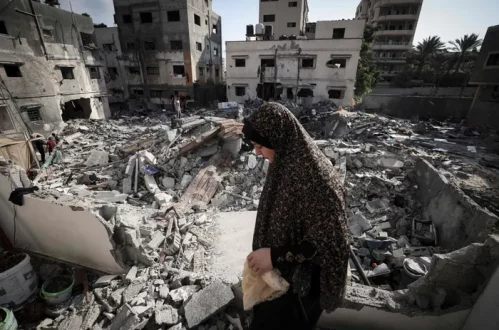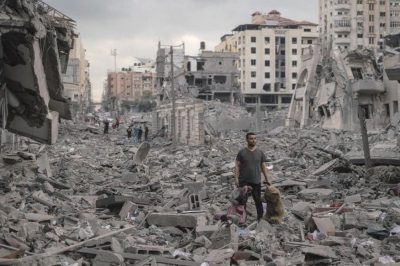The Gaza Strip, home to 2.3 million people, is experiencing a humanitarian crisis unequaled in its history. The current escalation of hostilities, which began with a Hamas attack on Israel in October 2023, has aggravated an already severe situation. This situation requires prompt attention and inventive solutions to ease the population’s suffering.
Since October 7, Israeli airstrikes have killed 4,385 Palestinians and injured 9,700. More than 1,756 children have reportedly died in 15 days of airstrikes on Gaza, with one child killed every 15 minutes, according to Save the Children, with children accounting for one-third of total fatalities in Gaza while the remaining children have been subjected to intense Israeli bombardment and unprecedented internal displacement, all of which have had devastating psychological and physical effects.

According to the Committee to Protect Journalists, 21 journalists lost their lives; 17 were Palestinian, three were Israeli, and one was Lebanese.
As UN Secretary-General António Guterres aptly says, “Even wars have rules, international humanitarian law and human rights legislation must be followed.”
A simple yet meaningful remark, “Even wars have rules,” emphasizes that certain norms of behavior bind all sides to armed confrontations. These norms exist to alleviate civilian suffering and maintain a semblance of civility in chaos.
Two fundamental principles form the basis of Guterres’ message: Firstly, each side must adhere to international humanitarian law, commonly known as the laws of war or the Geneva Conventions, which establishes standards for treating civilians and other individuals who are not directly involved in the conflict. This includes laws to protect the rights and well-being of civilians, prisoners of war, and injured soldiers. It offers clear principles for treating war victims humanely.
Human rights law, which seeks to protect the rights and freedoms of all people, includes protections for things like privacy, speech, and assembly and does not discriminate based on race, gender, religion, or nationality. These rights have the right to life, liberty, and security, as well as the right to be free from discrimination and violence. Every person’s rights and dignity must be upheld, even during turmoil.
The Coming Water and Electricity Crisis
Lack of access to electricity and clean, flowing water is one of Gaza’s most serious issues. As a result of Israel cutting off these crucial services, the people are struggling. This has caused taps to run dry across the territory, with residents receiving little and tainted water that is unsafe to drink. Aside from being inhumane, these circumstances also violate fundamental human rights.
Protecting Civilians and Upholding International Law
Secretary-General António Guterres’s remark highlights the gravity that relocating over a million people in a densely populated warzone without food, water, or shelter is highly risky. International human rights legislation and humanitarian law must be preserved and respected.
Guterres also stated that civilians must be safeguarded and never utilized as human shields. He highlights the importance of protecting people and preventing them from being used as human shields. This requires combatants to take all reasonable measures to prevent non-combatants from suffering harm and to refrain from using civilians as cover or as a source of protection.
Concerns of UNFPA and the Status of Women and Girls
The UN Population Fund (UNFPA) is deeply concerned about the safety and well-being of all civilians caught up in the crisis, particularly women and girls. The situation is critical, with hospitals in Gaza teetering on the verge of collapse and more than 50,000 pregnant women in Gaza battling to receive essential healthcare services.
The statement by Dr. Natalia Kanem, Executive Director of the United Nations Population Fund (UNFPA), graphically depicts the traumatic experiences of pregnant women in Gaza during the conflict. Her remarks offer a devastating peek into the tremendous agony experienced by these defenseless people as they must negotiate the dangerous route of escape from the turmoil of war.
“Each step felt like a race against death,” a harrowing depiction of pregnant mothers’ dangers in Gaza. Leaving their houses turns into a life-or-death struggle as the violence increases and bombs start to fall. The fight to preserve their own lives and the lives of their unborn children turns into a constant battle.
Also Read: Islamabad students rally for Gaza to show solidarity with Palestinian Children
This eyewitness account highlights the devastating effects of war on society’s weakest members, specifically pregnant mothers and their unborn children. The anguish, terror, and uncertainty they face are beyond description, and their resilience in the face of such adversity is nothing short of extraordinary.
Dr. Natalia Kanem’s statement underlines the necessity of providing urgent and ongoing assistance to expectant mothers living in conflict areas. It advocates for secure shelter and protection and access to primary maternal healthcare, including prenatal and postnatal care, in a context when hospitals and healthcare institutions are on the verge of collapsing.
UNFPA supplies crucial medicines and midwives, but this can only be sustained if lifesaving help is delivered to them. It is critical to demand rapid, unrestricted access for humanitarian purposes.
Schools and Hospitals are not Safe
In Palestine, the most defenseless children are forced to endure the unimaginable. Schools, intended to be secure havens for learning, are being targeted for destruction. Even the last shelter for the sick and disabled, hospitals, are not immune to the horrors of war.
The deadly explosion at Al-Ahli Hospital in Gaza City is heart-wrenching and distressing. The potential loss of hundreds of lives in a place meant to be a sanctuary for medical care is an indescribable tragedy. It’s crucial to remember that hospitals and healthcare facilities are not only critical for the wounded but also protected spaces under international humanitarian law.
This brutal tendency to attack children, schools, and hospitals is tragically broken international humanitarian law. Any attack on them violates the rules governing warfare, emphasizing the need for a collective commitment to safeguarding these essential institutions during conflict.
The Crisis’s Gendered Effects
The crisis’s gendered implications must not be neglected. According to UN Women, approximately 493,000 women and girls have lost their homes in Gaza. Thousands of children have lost their fathers, and there has been an increase in the number of women who are the primary breadwinners in their homes due to the violence. The urgent and specific needs of these girls and women must be met, as must the vulnerabilities they face.
New Approaches to the Humanitarian Crisis in Gaza
First and foremost, reducing this situation ensures rapid, unrestricted access to humanitarian aid. Everyone in need must receive food, medication, water, and fuel. This requires international coordination and pressure on every stakeholder involved to expedite the arrival of help.
Water and power shortages in Gaza have been going on for a long time; therefore, it’s important to find long-term solutions. Desalination and solar energy are two cutting-edge approaches that can offer sustainable access to electricity and clean water. Countries and international organizations can work together to implement these technologies.

Women’s economic independence requires addressing pervasive issues, including unemployment and bias against women. Supporting women’s economic empowerment through job development and vocational training can improve living conditions and lessen reliance on adult caretakers.
Programs for mental health care are required, given the high rates of depression and anxiety in Gaza. The population that has experienced trauma might receive emotional support via counseling services and community efforts.
Infrastructure development and reconstruction are crucial. Innovative building techniques, such as those using eco-friendly components and designs, can promote sustainable growth while meeting urgent requirements.
Providing students, especially females, with the chance to further their education is the highest priority. The crisis-related interruptions in education can be addressed by supporting institutions, offering scholarships, and creating e-learning platforms.

A Call for Global Unity
Time is of the essence in the current scenario in Gaza. Innovative solutions are required to alleviate suffering and preserve the rights of its citizens. The international community needs to come together to provide urgent access to aid, address the crisis’s gendered effects, and work toward long-term solutions for access to clean water, energy, and economic empowerment. We can only work toward a more tranquil and stable future in the area and aid the people of Gaza by banding together. Now is the time to act, and it is morally required that we do not ignore this humanitarian crisis.
International Relations Scholar interested in National Security strategies, with a good focus on Geo-Politics, Foreign Policy, and Public & Cultural Diplomacy.








